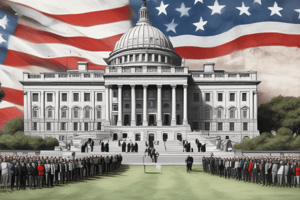Podcast
Questions and Answers
What is the difference between direct democracy and representative democracy?
What is the difference between direct democracy and representative democracy?
- Direct democracy is a form of monarchy, while representative democracy is a form of republic.
- Direct democracy involves the people directly making decisions, while representative democracy involves the people electing representatives to make decisions on their behalf. (correct)
- Direct democracy is only used in ancient Greece, while representative democracy is used in modern times.
- Direct democracy involves the people electing representatives to make decisions on their behalf, while representative democracy involves the people directly making decisions.
What is liberal democracy?
What is liberal democracy?
- A form of democracy where decision-makers are chosen randomly.
- A variant of representative democracy that emphasizes individual rights and freedoms and is subject to the rule of law. (correct)
- A form of direct democracy where citizens vote on every decision.
- A form of monarchy where the monarch's role is limited or symbolic.
What is the difference between a constitutional monarchy and a republic?
What is the difference between a constitutional monarchy and a republic?
- A constitutional monarchy has a monarch with a limited or symbolic role, while a republic has an elected head of state. (correct)
- A constitutional monarchy is a form of direct democracy, while a republic is a form of representative democracy.
- A constitutional monarchy has an elected head of state, while a republic has a monarch with a limited or symbolic role.
- A constitutional monarchy is a form of republic, while a republic is a form of monarchy.
What is sortition?
What is sortition?
What is consociational democracy?
What is consociational democracy?
What is the difference between participatory politics and guided democracy?
What is the difference between participatory politics and guided democracy?
What is cosmopolitan democracy?
What is cosmopolitan democracy?
What is creative democracy?
What is creative democracy?
What is shareholder democracy?
What is shareholder democracy?
Flashcards are hidden until you start studying
Study Notes
Democracy: A Brief History and Characteristics
-
Democracy is a form of government in which the people have the authority to deliberate and decide legislation.
-
The form of democracy has evolved over time from direct democracy to representative democracy.
-
Prevalent day-to-day decision making of democracies is the majority rule, but other decision-making approaches like supermajority and consensus have also been integral to democracies.
-
The term "democracy" is sometimes used as shorthand for liberal democracy, which is a variant of representative democracy that may include elements of civil society outside the government.
-
Democratic principles are reflected in all eligible citizens being equal before the law and having equal access to legislative processes.
-
Democratic assemblies are as old as the human species and are found throughout human history, but major political figures have largely opposed democracy.
-
Athenian democracy took the form of a direct democracy, and it had two distinguishing features: the random selection of ordinary citizens to fill the few existing government administrative and judicial offices, and a legislative assembly consisting of all Athenian citizens.
-
Even though the Roman Republic contributed significantly to many aspects of democracy, only a minority of Romans were citizens with votes in elections for representatives.
-
While most regions in Europe during the Middle Ages were ruled by clergy or feudal lords, there existed various systems involving elections or assemblies, although often only involving a small part of the population.
-
The Parliament of England had its roots in the restrictions on the power of kings written into Magna Carta (1215), which explicitly protected certain rights of the King's subjects.
-
The emergence of petitioning is some of the earliest evidence of parliament being used as a forum to address the general grievances of ordinary people.
-
The term "republic" encompassed both democracies and aristocracies.A Brief History of Democracy
-
Democracy has its roots in ancient Greece, where citizens participated in direct democracy.
-
The Roman Republic also had elements of democracy, with elected officials and a Senate.
-
The Middle Ages saw the emergence of new classes, such as artisans, as well as nobility and religious elites.
-
The fragmentation of Europe after the collapse of the Roman Empire led to the emergence of representative government.
-
In Poland, noble democracy saw an increase in the activity of the middle nobility and the establishment of the institution of the land sejmik.
-
The English Civil War and Glorious Revolution in the 17th century prompted the growth of political philosophy in Britain, with Thomas Hobbes and John Locke offering different interpretations of social contract theory.
-
North America saw the establishment of representative government in Jamestown, Virginia, and the democratic organization of Puritan and Quaker communities in New England.
-
The 18th and 19th centuries saw the expansion of the voting franchise in the UK and the adoption of the United States Constitution, which provided for an elected government and protected civil rights and liberties for some.
-
The 20th century saw successive "waves of democracy" resulting from wars, revolutions, decolonisation, and economic circumstances.
-
World War II brought a definitive reversal of the trend of non-democratic governments in western Europe, followed by decolonisation and the emergence of nominally democratic states.
-
The third wave of democratisation in the late 20th century brought substantial gains toward true liberal democracy for many states, including Portugal, Spain, and several military dictatorships in South America.
-
The liberal trend spread to some states in Africa in the 1990s, and there have been recent attempts at liberalisation in various countries around the world.
-
The fight for democracy and the expansion of civil rights continues to this day.The State of Democracy around the World
-
The number of electoral democracies has increased from 40 in 1972 to 123 in 2007.
-
Electoral democracies now represent 120 of the 192 existing countries and constitute 58.2 percent of the world's population.
-
Liberal democracies are 85 in number and represent 38 percent of the global population.
-
The United Nations declared 15 September the International Day of Democracy in 2007.
-
Most electoral democracies exclude those younger than 18 from voting.
-
The voting age has been lowered to 16 for national elections in some countries, including Brazil, Austria, Cuba, and Nicaragua.
-
According to Freedom House, there have been eleven consecutive years (starting in 2005) in which declines in political rights and civil liberties throughout the world have outnumbered improvements.
-
Nationalist and populist political ideologies are gaining ground, at the expense of the rule of law, in countries like Poland, Turkey, and Hungary.
-
Democratic backsliding in the 2010s was attributed to economic inequality and social discontent, personalism, poor management of the COVID-19 pandemic, government manipulation of civil society, "toxic polarization," foreign disinformation campaigns, racism and nativism, excessive executive power, and decreased power of the opposition.
-
Three contending conceptions of democracy are aggregative democracy, deliberative democracy, and radical democracy.
-
Several variants of democracy exist, but there are two basic forms: direct democracy and representative democracy.
-
Some modern democracies that are predominantly representative in nature also heavily rely upon forms of political action that are directly democratic, termed hybrid democracies, semi-direct democracies or participatory democracies.Different Types of Democracy
-
Constitutional monarchy is a form of democracy in which the monarch's role is limited or symbolic.
-
The term republic refers to a representative democracy with an elected head of state, as opposed to a hereditary monarch.
-
Liberal democracy is a representative democracy subject to the rule of law, with emphasis on individual rights and freedoms.
-
Socialist thought has different views on democracy, with some believing in participatory, industrial, economic, and workplace democracy.
-
Anarchists are split on the concept of democracy, with some believing that only direct democracy is acceptable, while others support majority rule.
-
Sortition is a form of democracy that chooses decision-makers randomly, as opposed to elected officials.
-
Consociational democracy is a power-sharing formula based on simultaneous majority votes in two or more ethno-religious constituencies.
-
Consensus democracy involves decision-making through broad range opinions, as opposed to systems where minority opinions can be ignored.
-
Participatory politics involve a Nested Council structure, with decision-making power proportional to how much people are affected by the decision.
-
Cosmopolitan democracy aims to implement democracy on a global scale, with people affected by decisions having a say in them.
-
Creative democracy encourages individual capacity building and interaction among society.
-
Guided democracy incorporates regular popular elections, but the choices are often guided, reducing the electorate's ability to determine the type of government.
-
Non-governmental democracy uses democratic principles and mechanisms in non-governmental organizations, trade unions, cooperatives, and corporations.
-
Shareholder democracy is a concept that relates to the governance of corporations by shareholders.
Studying That Suits You
Use AI to generate personalized quizzes and flashcards to suit your learning preferences.




